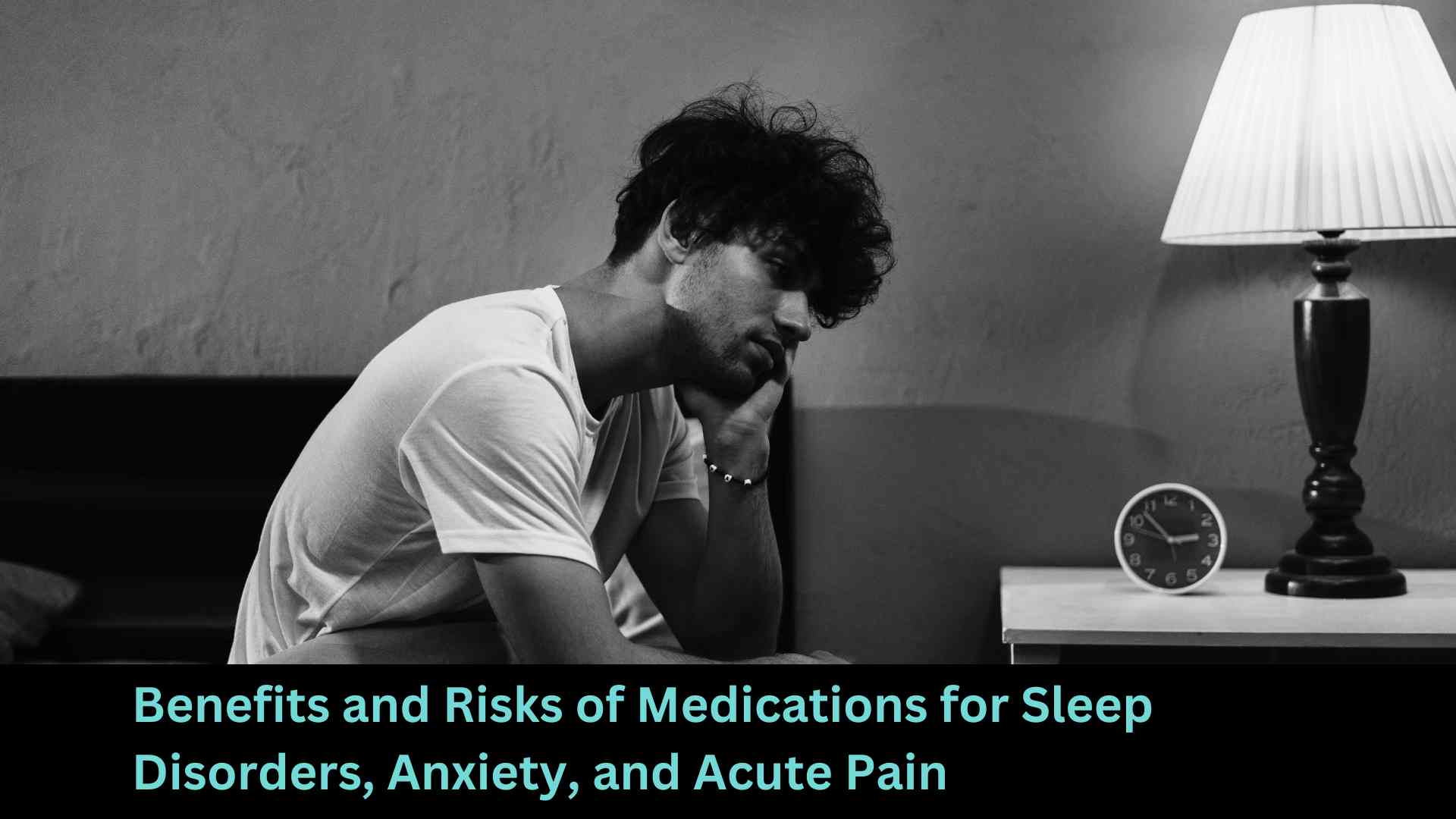
- sleep disorders, anxiety
-
by rohit1
Medications for sleep disorders, anxiety, and acute pain can offer significant relief but also come with potential risks. In this comprehensive guide, we’ll explore the benefits and risks associated with these medications, provide insights into their proper use, and discuss alternative therapies. Our aim is to help you make informed decisions about your health and wellness.

Medications for Sleep Disorders, Anxiety
Common Medications:
- Benzodiazepines (e.g., Temazepam)
- Non-Benzodiazepine Hypnotics (e.g., Zolpidem, Eszopiclone)
- Melatonin Receptor Agonists (e.g., Ramelteon)
- Antidepressants (e.g., Trazodone)
- Antihistamines (e.g., Diphenhydramine)
Benefits of Medications for Sleep Disorders:
Improved Sleep Onset: Medications can help individuals fall asleep faster, addressing issues like insomnia.
- Increased Sleep Duration: They can extend the length of sleep, ensuring a full night’s rest.
- Enhanced Sleep Quality: These medications promote deeper, more restorative sleep, improving overall health and well-being.
Risks of Medications for Sleep Disorders:
- Dependence and Tolerance: Over time, users may develop a dependence on sleep medications and need higher doses to achieve the same effect.
- Cognitive Impairment: These drugs can cause next-day drowsiness, confusion, and memory issues, impacting daily activities.
- Complex Sleep Behaviors: Some people experience sleepwalking, sleep driving, or other activities while not fully awake.
- Withdrawal Symptoms: Abrupt discontinuation can lead to anxiety, agitation, or rebound insomnia.

Medications for Anxiety
Common Medications:
- Benzodiazepines (e.g., Diazepam, Lorazepam)
- Selective Serotonin Reuptake Inhibitors (SSRIs, e.g., Sertraline, Escitalopram)
- Serotonin-Norepinephrine Reuptake Inhibitors (SNRIs, e.g., Venlafaxine)
- Buspirone
- Beta-Blockers (e.g., Propranolol)
Benefits of Medications for Anxiety:
- Symptom Relief: Anxiety medications reduce symptoms like excessive worry, agitation, and nervousness, providing much-needed relief.
- Improved Functionality: These medications help individuals perform daily tasks and engage in social activities without overwhelming anxiety.
- Quick Acting (Benzodiazepines): Benzodiazepines provide rapid relief of acute anxiety symptoms, offering immediate comfort.
Risks of Medications for Anxiety:
- Dependence and Tolerance (Benzodiazepines): There’s a risk of addiction and reduced effectiveness over time with benzodiazepines.
- Side Effects: SSRIs and SNRIs can cause drowsiness, dizziness, weight gain, and sexual dysfunction.
- Withdrawal Symptoms: Stopping benzodiazepines abruptly can lead to anxiety, insomnia, and seizures.
- Interactions: These medications can interact with other drugs or substances, sometimes dangerously.
Medications for Acute Pain
Common Medications:
- Nonsteroidal Anti-Inflammatory Drugs (NSAIDs, e.g., Ibuprofen, Naproxen)
- Acetaminophen (Paracetamol)
- Opioids (e.g., Morphine, Oxycodone)
- Corticosteroids (e.g., Prednisone)
- Local Anesthetics (e.g., Lidocaine)
Benefits of Medications for Acute Pain:
- Pain Relief: Medications effectively reduce moderate to severe pain, allowing for greater comfort.
- Anti-Inflammatory (NSAIDs): NSAIDs reduce inflammation, which can contribute significantly to pain relief.
- Improved Mobility and Function: With reduced pain, individuals can perform daily activities more easily.
Risks of Medications for Acute Pain:
- Gastrointestinal Issues (NSAIDs): NSAIDs can cause stomach ulcers, bleeding, and gastrointestinal upset.
- Liver Damage (Acetaminophen): High doses of acetaminophen can lead to liver toxicity.
- Dependence and Tolerance (Opioids): Opioids carry a high risk of addiction and reduced effectiveness over time.
- Respiratory Depression (Opioids): These drugs can cause a dangerous reduction in breathing rate.
- Side Effects: Common side effects of opioids include nausea, constipation, and dizziness.

Safe Use of Medications
Consulting Healthcare Providers:
Before starting any medication, it’s crucial to consult with healthcare providers to ensure the chosen treatment is appropriate for your condition. This helps in minimizing risks and maximizing benefits.
Following Prescriptions:
Always follow the prescribed dosage and schedule. Misuse of medications can lead to serious health issues, including overdose and addiction.
Monitoring Side Effects:
Keep track of any side effects and report them to your healthcare provider. They may adjust the dosage or switch medications to find a better fit.
Considering Alternatives:
In addition to medications, consider alternative treatments such as therapy, lifestyle changes, and natural remedies. These can often complement or even replace the need for certain medications.
Integrating Lifestyle Changes for Better Outcomes in Sleep Disorders, Anxiety
Sleep Hygiene:
Practicing good sleep hygiene can improve sleep quality and reduce dependence on medications. This includes maintaining a regular sleep schedule, creating a comfortable sleep environment, and avoiding stimulants before bedtime.
Stress Management:
Techniques such as mindfulness, meditation, and exercise can help manage anxiety and reduce the need for medication.

Physical Therapy:
For acute pain, physical therapy and other non-pharmacological treatments can be effective in promoting recovery and reducing pain.
Internal Links:
- Comprehensive Guide to Managing Insomnia
- Natural Remedies for Anxiety Relief
- Effective Pain Management Strategies
External Links:
- National Institute of Mental Health on Anxiety Disorders
- Centers for Disease Control and Prevention on Opioid Overdose
- Mayo Clinic on Sleep Disorders
Conclusion
Medications for sleep disorders, anxiety, and acute pain can provide significant relief and improve quality of life. However, it’s essential to be aware of the associated risks and use these medications responsibly. Always consult with healthcare providers, follow prescriptions, monitor side effects, and consider alternative treatments to achieve the best outcomes for your health and well-being.
This comprehensive guide aims to equip you with the knowledge needed to make informed decisions about using medications for these conditions. Stay informed, stay safe, and take proactive steps towards better health.


